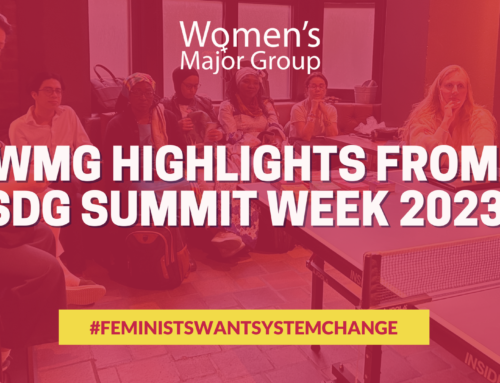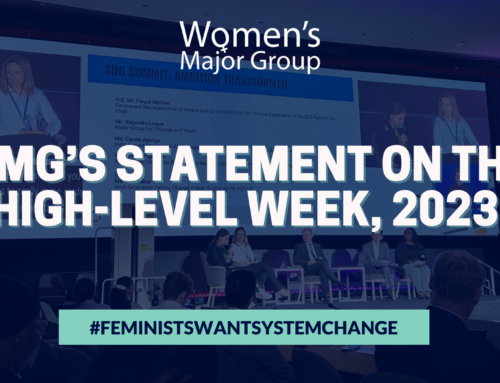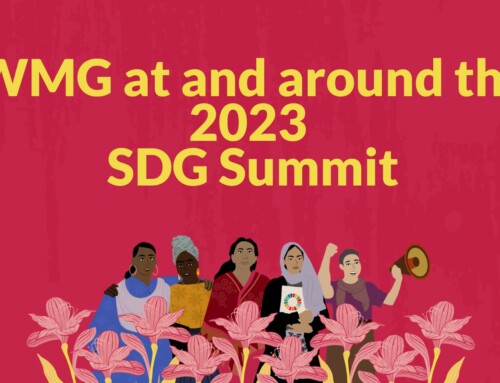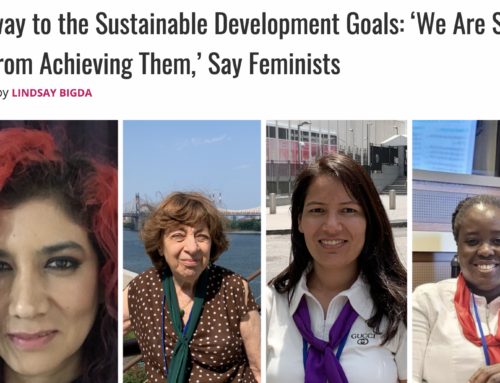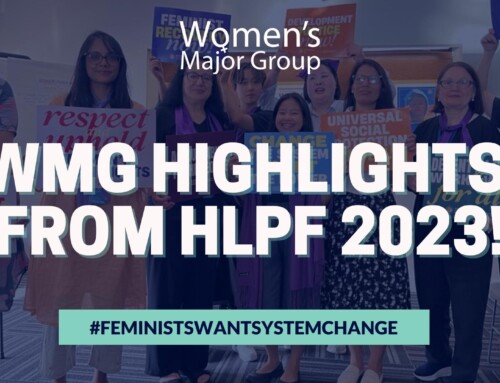Women's Major Group Introduction
We are writing to introduce you to the Women’s Major Groups Organizing Partners (OPs) for the period 2014-2016. We are very excited at the opportunity to work with you all to facilitate women’s participation and leadership in sustainable development processes over the next two years. The team of eight Women’s Major Group OPs is comprised of the following organizations:
Asia Pacific Forum on Women, Law & Development (Asia and the Pacific) Contact: Wardarina, Tessa Khan, Kate Lappin, and Phicayapuk Leangsombuk. Email: wmg@apwld.org
APWLD, Asia Pacific’s leading feminist, membership-driven network, works to promote women’s human rights enshrined in international human rights instruments, and to empower women and their movements in Asia to claim equality, justice, peace and sustainable and inclusive development. They have 180 members representing rural, indigenous, migrant women organisations and groups of diverse women from 26 countries in the region. They use capacity development, feminist participatory action research, advocacy and activism to claim and strengthen women’s human rights. Their diverse membership provides the strength and expertise that both drives and executes their works on issues related to trade and finance, land-rights, food sovereignty, decent work and living wage, environment, climate justice, peace and security, and women’s leadership and political participation.
Gender Equity: Citizenship, Work and Family (Equidad de Género: Ciudadanía, Trabajo y Familia) (Latin America and the Caribbean) Contact: Emilia Reyes. Email: emilia@equidad.org.mx
Equidad de Género promotes equality between women and men through the development and incorporation of public policy proposals with a gender perspective and the strengthening of women’s leadership and civil participation in all aspects of political and social life in Mexico. They have extensive experience advocating in Mexico and at the regional and global levels. Equidad is an organization comprised of leaders and experts in gender equality, women’s human rights, especially sexual and reproductive rights, and women’s political participation and economic empowerment.
Forum of Women’s NGOs of Kyrgyzstan (Central Asia & Europe) Contact: Nurgul Dzhanaeva. Email: dnurgul@yahoo.com. The Forum of Women’s NGOs of Kyrgyzstan works to consolidate and strengthen the Kyrgyz women’s movement towards gender equality and women’s empowerment, building partnership towards women’s equality, and increasing women’s participation in public life through their organizations and NGOs. As part of this mission Forum of Women’s NGOs of Kyrgyzstan contributed to women’s organizations’ capacity development, organization of active networking in Kyrgyzstan and in Central Asia, promotion of integration of women’s activism into the global trend of women’s movement. They have experience advocating in Asia, Europe and at the Global level.
Global Forest Coalition (GFC) (Global) Contact: Isis Alvarez. Email: isis.alvarez@globalforestcoalition.org
The Global Forest Coalition (GFC) is an international coalition of NGOs and Indigenous Peoples’ Organizations defending social justice and the rights of forest peoples in forest policies. GFC participates in international forest policy meetings and organizes joint advocacy campaigns on issues like Indigenous Peoples’ rights, the need for socially-just forest policy and the need to address the underlying causes of forest loss. GFC believes forest conservation policies that ignore the rights, needs, and role of Indigenous Peoples, Local Communities and Women violate fundamental human rights and are in conflict with the need to create support for forest protection amongst a broader community. We believe that people will ignore laws and policies that they see as elitist and fundamentally flawed. Thus both forest protection and Indigenous and human rights suffer from such an approach.
International Women’s Health Coalition (IWHC) (North America) Contact: Shannon Kowalski. Email: skowalski@iwhc.org
IWHC promotes and protects the sexual and reproductive rights and health of women and young people—particularly adolescent girls—in Africa, Asia, Latin America, and the Middle East. IWHC advocates for progressive policies that protect women’s and girls’ human rights and health at the global level at the UN and with multilateral organizations; in Washington DC to ensure strong US foreign policy; and with partners in Latin America, Asia, Africa, and the Middle East by providing funding and technical support. IWHC is committed to building bridges between local realities and global policies by ensuring that women and young people in the Global South are connected to key decisionmakers and engaged in global and regional policymaking processes.
Women Environmental Programme (Africa) Contact: Priscilla Achakpa. Email: Priscilla.achakpa@wepnigeria.net
WEP works to address the gender injustices on issues relating to the environment, economic and social rights of women, children and youths in society. They are headquartered in Abuja, Nigeria and have offices in Burkina Faso and Togo and have been actively engaged with the Women’s Major Group in regional and global processes.
Women in Europe for a Common Future (WECF) (Global) Contact: Sascha Gabizon. Email: sascha.gabizon@wecf.eu
Women in Europe for a Common Future (WECF) is an international network of over 150 women’s, environmental and health organisations implementing projects in 50 countries and advocating globally for a healthy environment for all. With our international team (Women International for a Common Future) we focus on bringing women’s rights and gender equality to the forefront of sustainable development policies, always ensuring that local priorities form the basis for policy recommendations and analysis. We support our local partners in policy advocacy at local, national and regional level, as well as to demonstrate through practical pilot projects what we mean with gender-equitable sustainable development, currently with projects in several Eastern European, Central Asian and African countries.
Women’s Environment & Development Organization (WEDO) (Global) Contact: Eleanor Blomstrom. Email: eleanor@wedo.org
WEDO works to ensure that women’s rights; social, economic and environmental justice; and sustainable development principles, as well as the linkages between them, are at the heart of global and national policies, programs and practices. It allies with women’s organizations; environmental, development and human rights organizations; governments; and intergovernmental organizations, including the United Nations. WEDO’s core competency has been high-level advocacy in international arenas while building bridges among a range of stakeholders. The team of OPs is diverse, with complementary areas of expertise and experience. All have a long track record of organizing women to effect change at the national, regional and global levels and all have been deeply involved in the work of the Women’s Major Group of the past several years. We are convinced that together we will be a strong team that will not only increase the capacity of the Women’s Major Group but helps to ensure that diverse women’s voices are heard in the halls of power at the UN. Over the next year, the Women’s Major Group will be involved in facilitating women’s participation in various intergovernmental processes related to sustainable development, including the negotiations on the Post-2015 Development Agenda, the High-Level Political Forum, and the Third International Conference on Financing for Development, among other forums. Before the end of the year, we will outline a process for defining a strategy for the Women’s Major Group’s work in 2015. We are committed to facilitating accountable and transparent spaces for women to discuss and strategize together in the years ahead. And we count on all of your support to make sure that the WMG remains a formidable force! Best, Wardarina, Emilia, Priscilla, Sascha, Isis, Eleanor, Nurgul and Shannon

